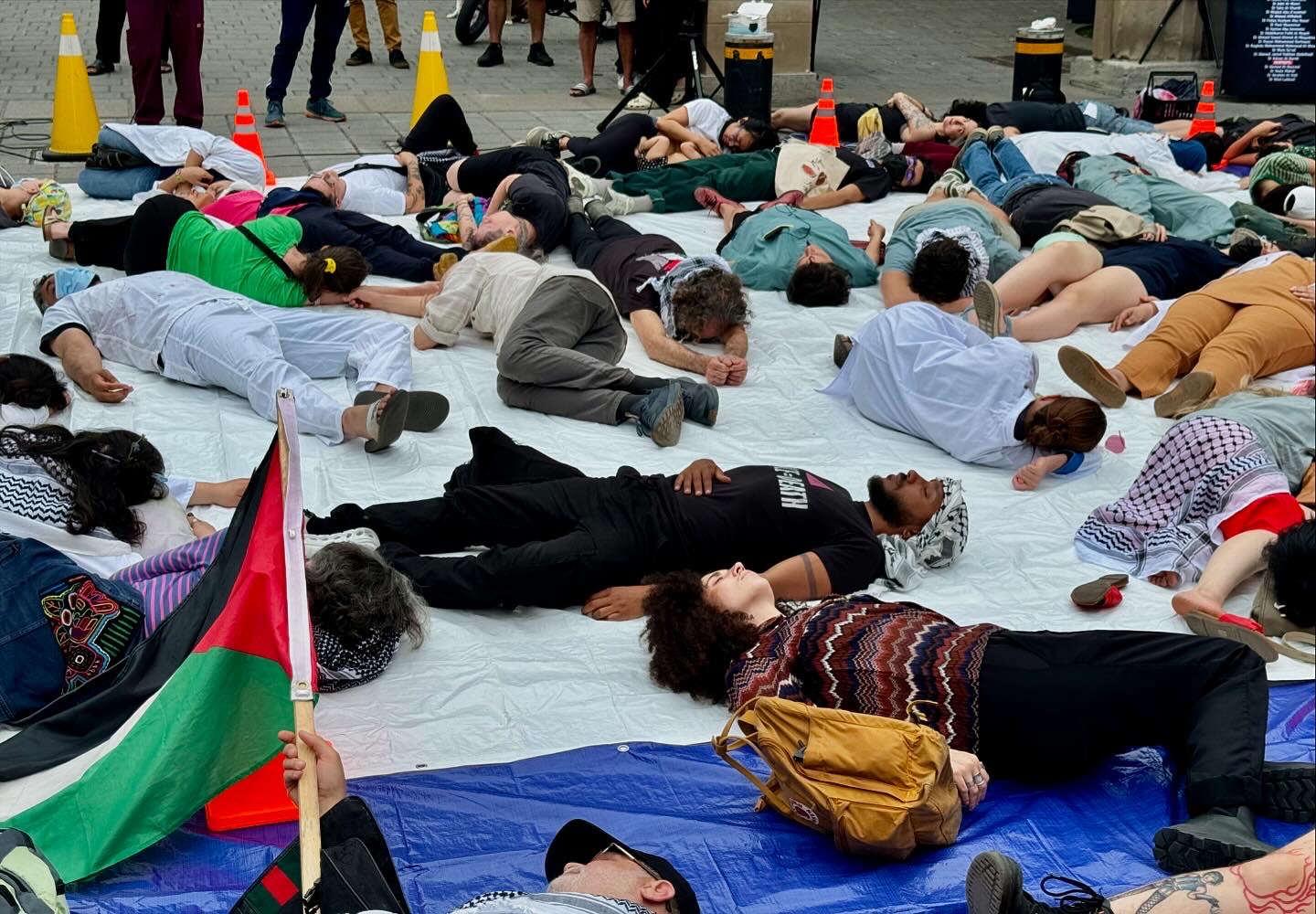Who’s Allowed to Mourn in Public—and Who’s Not
It was quiet at first. Just a few of us lying on the cold concrete outside of McGill University. Keffiyehs folded. Bodies arranged—not for spectacle, but for mourning.
The die-in wasn’t meant to go viral. It was meant to say what the system refuses to name:
Gaza is being erased.
And health workers know what genocide looks like.
I remember the weight of my own breath as I lay there.
Not heavy. Not performative. Just present.
Someone walked by and snapped a photo without asking. Another didn’t stop at all.
When we stood up, nothing had changed. Not on the street. Not in the news.
But something had settled in my chest. Something that hasn’t left.
Because we weren’t only laying our bodies down for Gaza.
We were laying down with the knowledge that our grief is never allowed to be grief.
Not when it’s Black.
Not when it’s queer.
Not when it’s tied to Palestine, or trans lives, or state violence.
That kind of grief doesn’t get candles.
It gets cops.
It doesn’t get statements.
It gets silence.
And sometimes, if we’re not careful, it gets turned inward—
Treated like something to suppress. Something to explain away.
Too emotional. Too disruptive.
The wrong kind of grief.
Black Grief as Threat
Black grief has never been read as grief.
It’s read as aggression.
As instability.
As a problem to manage.
A vigil for a Black life becomes a police incident.
A protest gets framed as a riot.
A mother weeps on camera, and the story pivots to property damage.
This isn’t new.
But that doesn’t make it any less violent.
Even in so-called progressive spaces—health orgs, queer collectives, activist networks—there are unwritten rules:
Don’t cry too hard.
Don’t speak too plainly.
Don’t say something that makes people uncomfortable.
I’ve been in those rooms.
Told I was “too emotional” for naming what hurt.
Asked to “come back when calmer” as if grief needed to be reasonable to be real.
But Black grief doesn’t belong to institutions.
It doesn’t need to be tidy.
It doesn’t need to be polite.
It shows up where it’s needed:
In kitchens. In bathrooms. In the street. In the quiet moment after the meeting ends.
And maybe that’s what makes it dangerous.
That we still feel.
That we still care.
That we refuse to forget.
Because in a world trying to erase us, grieving is a form of resistance.
Palestinian Grief and the Politics of Denial
If Black grief is read as a threat, Palestinian grief is denied altogether.
Or worse—criminalized.
In recent months, we’ve watched mourning itself become a battleground.
Vigils banned.
Flags confiscated.
Photos of murdered children labeled “too political.”
The dead rendered offensive.
The living forbidden to name them.
The message is clear:
You can grieve, but not like that.
Not too visibly.
Not too loudly.
Not in a way that disrupts the narrative.
The same governments funding the bombs demand silence about the bodies.
But Palestinian grief refuses to stay quiet.
It pours into streets, onto murals, through chants.
It insists on being seen—even when the world tries to look away.
And that insistence resonates.
Because for many of us—Black, queer, displaced—it feels familiar.
We know what it means to mourn in public and be told it’s too much.
We know what it means to be asked to tone it down, make it palatable, put it away.
Still, we mourn.
Together.
In public.
Without apology.
Queer Mourning and Rituals of Refusal
Queer people have always built our own ways to mourn.
No one gave us space.
So we carved it out ourselves.
In clubs. In alleyways. In bedrooms and chat threads.
We’ve lit candles in parking lots.
Laid flowers on steps where no police ever came.
Held vigils that no news crew covered.
Carried names no one else bothered to say.
This is part of our lineage:
ACT UP die-ins.
Ashes delivered to government steps.
Protests that doubled as funerals.
Grief that refused to be silent.
That legacy is still with us.
Every time a trans name is whispered online because no outlet printed it.
Every time someone cries in a bathroom after reading a headline and someone else holds them.
Queer mourning doesn’t always look like mourning.
Sometimes it’s awkward.
Sometimes it’s loud.
Sometimes it’s just showing up.
But it’s always a refusal.
A refusal to grieve quietly.
A refusal to perform respectability.
A refusal to act like this world hasn’t taken too much from us.
This grief is a kind of care.
Not the kind taught in workshops.
The kind that says:
“I see you. I’ll carry this with you. Even if no one else will.”
Grief That Doesn’t Fit
I’ve been in spaces where I knew I wasn’t allowed to grieve.
Not really.
I could speak, maybe. But not feel too much.
Not shake the frame.
Not say something that might get labeled “too intense.”
Sometimes, the silencing is subtle.
Someone avoids eye contact.
A conversation gets politely redirected.
A room falls quiet—not in respect, but discomfort.
I remember being told I was ben énervé for naming the violence of Black bodies on slides, with no disaggregated data, no context, no care.
Just images.
Just performance.
I wasn’t angry.
I was grieving.
Grieving the way our lives get reduced to symbols.
Grieving the absence of real recognition.
Even that was too much.
Most of us learn to shrink our grief until it fits.
Until it sounds strategic.
Until it’s digestible.
And when it doesn’t shrink, we’re called unstable.
Disruptive.
Unprofessional.
But grief isn’t supposed to make people comfortable.
It isn’t a moment.
It’s a condition.
It lingers in the breath, in the body, in the way your shoulders won’t release even when the meeting ends.
Some days, I carry it like fog.
Some days, like glass.
Some days, it doesn’t arrive until I’ve taken off the mask and closed the door behind me.
But I no longer apologize for it.
Because I’ve learned something simple:
Grief is proof that something hasn’t been taken from me.
Not yet.
Toward Abolitionist Mourning
We need to stop pretending grief only matters when it’s quiet, clean, or backed by institutions.
We need to stop asking the systems that harm us to validate the losses they cause.
Abolitionist mourning doesn’t wait for permission.
It doesn’t ask for policy.
It doesn’t make pain legible to power.
It mourns on its own terms—messy, collective, unsanctioned.
It stays with what hurts.
It lets the wound speak.
We’ve always known how to do this.
Black and Indigenous people have mourned in ways the state can’t hold.
Palestinians have carried memory through exile and massacre.
Trans people create rituals that no church would sanctify.
We don’t need more professionalization of pain.
We need more space for its truth.
More honesty.
More refusal.
Because grief is not what breaks us.
What breaks us is having nowhere to put it.
And what repairs us—if anything does—
is knowing we don’t have to carry it alone.
We’re Still Mourning
We don’t need the state’s recognition to make our grief real.
We don’t need institutions to validate what our bodies already know.
Our mourning isn’t excessive.
It isn’t disruptive.
It isn’t unprofessional.
It’s memory.
It’s survival.
It’s care.
And it’s not going anywhere.
If the world refuses to hold our grief,
then we will keep finding other ways to carry it.
We will light candles where they say we can’t.
We will chant the names they refuse to speak.
We will gather in the cracks and hold each other there.
Our grief isn’t the problem.
The problem is a world that only makes space for it once we’re gone.
We’re still here.
We’re still mourning.
And we’re not asking for permission.


Leave a Reply